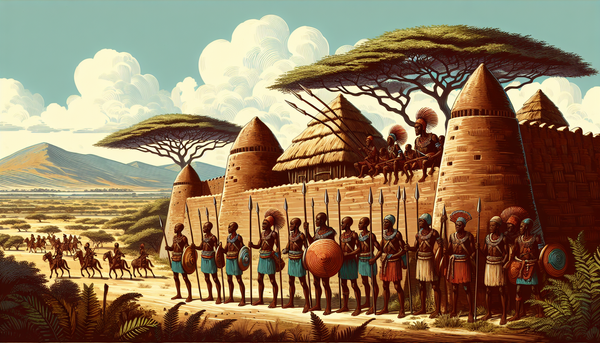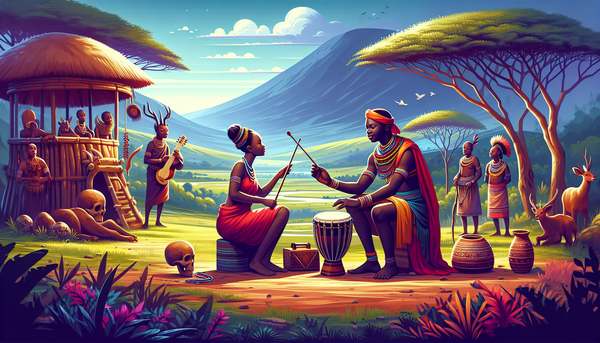Contributions of African Scientists in the 21st Century

Innovations in Renewable Energy by African Physicists
In the 21st century, African physicists have made significant strides in renewable energy technologies, addressing some of the continent's most pressing energy challenges. With abundant resources such as solar radiation, wind, and biomass, innovative research has been crucial in tapping into these sustainable sources.
One landmark achievement is the development of affordable solar photovoltaic systems tailored for rural communities. For instance, scientists from South Africa have engineered cost-effective solar panels that can be easily assembled, drastically reducing energy costs for households in off-grid areas. This innovation not only promotes energy access but also contributes to economic empowerment by creating local jobs.
Moreover, researchers in Kenya have been exploring the potential of geothermal energy, harnessing the East African Rift's volcanic activity to generate electricity. This initiative is set to enhance energy security and reduce reliance on fossil fuels.
Additionally, many African physicists are now collaborating with international organizations to develop policies that support renewable energy initiatives. These partnerships aim to facilitate technology transfer and ensure sustainable practices are adopted.
Through these pioneering efforts, African physicists are at the forefront of a renewable energy revolution, positioning the continent as a key player in the global transition towards sustainable energy solutions.
Advancements in Biotechnology and Genetics by African Researchers
In recent years, African researchers have emerged as leaders in the fields of biotechnology and genetics, driving innovations that address local and global health challenges. With diverse ecosystems and species, Africa is uniquely positioned to contribute to biotechnological advancements, especially in agriculture and medicine.
Notably, researchers in countries like Nigeria and Ghana have developed genetically modified organisms (GMOs) that are resistant to pests and diseases, significantly improving crop yield and food security. These advancements are crucial in combating the impact of climate change on agriculture, as they enable farmers to adapt to shifting conditions while reducing reliance on chemical pesticides.
In the realm of medicine, African geneticists are making remarkable progress in understanding and treating diseases prevalent on the continent, such as malaria and HIV/AIDS. Collaborative projects involving universities and international partners have led to breakthroughs in vaccine development and novel therapeutics.
Furthermore, initiatives focused on gene editing technologies, like CRISPR, are being explored by African scientists to enhance genetic traits in plants and animals. These pioneering efforts not only contribute to innovation within Africa but also position the continent as a vital player in the global biotechnology landscape, enhancing health, agriculture, and sustainability.
Breakthroughs in Medical Research and Public Health by African Scientists
African scientists are at the forefront of groundbreaking medical research and public health initiatives, addressing endemic diseases and improving health outcomes across the continent. A prime example is the collaborative research efforts to develop effective vaccines for diseases such as malaria and Ebola. These initiatives harness local expertise and cultural knowledge, ensuring that solutions are tailored to the specific needs of communities.
In recent years, researchers from Africa have made significant advancements in understanding the genetics of infectious diseases, enabling targeted therapies and personalized medicine approaches. For instance, studies conducted in sub-Saharan Africa have uncovered genetic markers associated with increased susceptibility to malaria, paving the way for innovative treatment strategies.
Additionally, public health initiatives led by African scientists have focused on combating non-communicable diseases, such as hypertension and diabetes, which are on the rise across the continent. Through community outreach, education programs, and data collection, these initiatives aim to implement preventive measures and improve healthcare access.
Moreover, the COVID-19 pandemic highlighted the critical role of African research institutions in vaccine distribution and public health strategies. Collaborations with global health organizations have fostered rapid responses to emerging health crises, showcasing Africa's potential as a leader in global health research and innovation.
Developments in Information Technology and Artificial Intelligence by African Experts
In the 21st century, African experts have made remarkable advancements in information technology (IT) and artificial intelligence (AI), positioning the continent as a burgeoning hub for innovation. With a youthful population and increasing internet penetration, African nations are leveraging technology to tackle local challenges and drive economic growth.
One significant development is the rise of tech startups across cities like Nairobi, Lagos, and Cape Town. These companies are creating AI solutions that address issues such as healthcare access, financial inclusion, and agricultural productivity. For instance, AI algorithms are being used to analyze agricultural data, optimizing crop yields and providing farmers with crucial insights to improve their livelihoods.
Furthermore, African researchers are contributing to global AI research by developing algorithms that reflect the continent’s unique socio-economic contexts. Collaborative efforts between academia and industry are fostering an environment where local talent can thrive, leading to innovations like natural language processing systems for African languages.
Education initiatives, such as coding boot camps and tech incubators, are also empowering the next generation of African technologists. By nurturing skills in IT and AI, Africa is on a transformative path toward digital sovereignty, ensuring that the continent can actively participate in the global knowledge economy while addressing its own socio-economic challenges.
Contributions to Environmental Science and Climate Change Mitigation
African scientists are making significant strides in environmental science and climate change mitigation, as they confront pressing ecological challenges that threaten the continent's rich biodiversity and livelihoods. With unique ecosystems ranging from savannas to rainforests, African researchers are at the forefront of understanding climate dynamics and developing sustainable solutions.
One notable contribution is the implementation of innovative conservation programs aimed at protecting endangered species and habitats. For instance, scientists are utilizing remote sensing technology to monitor deforestation and assess the impact of climate change on vulnerable ecosystems. This data-driven approach aids policymakers in making informed decisions about resource management and ecosystem preservation.
Furthermore, African researchers are advocating for sustainable agricultural practices that enhance food security while reducing greenhouse gas emissions. Agroecology, which emphasizes biodiversity and local knowledge, is being promoted as a viable solution to mitigate climate impacts while improving soil health and crop resilience.
Additionally, collaborations between African nations and international bodies have led to initiatives focused on renewable energy adoption. Projects harnessing solar and wind power not only offer sustainable energy solutions but also create job opportunities and stimulate economic development. Through these efforts, African scientists are actively contributing to global climate action, shaping a more sustainable future for the continent and beyond.
Pioneering Research in Quantum Computing and Nanotechnology by African Academics
African academics are increasingly emerging as key players in the fields of quantum computing and nanotechnology, making significant contributions that are shaping the future of these advanced technologies. With a focus on harnessing the continent's scientific potential, researchers are exploring novel applications of quantum systems and nanoscale materials.
One of the notable advancements in quantum computing has been the establishment of research initiatives aimed at developing quantum algorithms and cryptographic protocols tailored for local challenges. Academics in South Africa, for instance, have begun to collaborate with international partners to study quantum error correction and communication systems, positioning the continent as a rising center for theoretical and applied quantum research.
In nanotechnology, African scientists are innovating by creating nanomaterials with unique properties for applications in healthcare, electronics, and environmental remediation. Projects focusing on the development of nano-sensors for detecting pollutants and diseases exemplify the commitment to addressing critical issues facing local communities.
Furthermore, universities and research institutions in Africa are fostering interdisciplinary collaboration, blending insights from physics, materials science, and engineering. This synergy not only enhances the research landscape but also cultivates the next generation of scientists and engineers, ensuring that Africa plays a vital role in the global advancement of quantum computing and nanotechnology.
Impact on Astronomy and Space Exploration by African Astronomers
African astronomers are making significant contributions to the field of astronomy and space exploration, helping to reshape our understanding of the universe while inspiring a new generation of scientists. With a rich history of astronomical observation, the continent is now poised to play a vital role in modern space research.
One of the landmark achievements is the establishment of major observatories in Africa, such as the South African Astronomical Observatory and the MeerKAT radio telescope in the Karoo Desert. MeerKAT is part of the Square Kilometre Array (SKA) project, which is set to be the world's largest radio telescope, enabling groundbreaking discoveries about the origins of the universe, dark matter, and the formation of galaxies.
Moreover, African astronomers are actively participating in international collaborations, contributing to research on exoplanets, cosmic microwave background radiation, and gravitational waves. Initiatives like the African Very Long Baseline Interferometry Network (AVN) aim to enhance the continent's infrastructure and capabilities in radio astronomy.
Additionally, educational programs and outreach efforts are inspiring youth across Africa to explore careers in STEM fields, fostering a sense of ownership in scientific exploration. Through these endeavors, African astronomers are not only advancing astronomical research but also contributing to global initiatives in space exploration and discovery.



